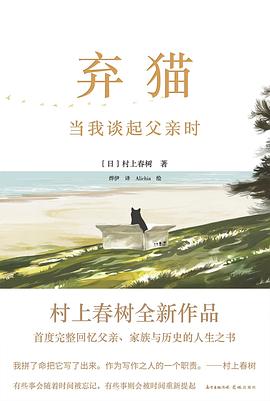WULOLIFE
《弃猫》作者: [日] 村上春树 出版社: 花城出版社
《弃猫》作者: [日] 村上春树 出版社: 花城出版社
Couldn't load pickup availability
Description
内容简介 · · · · · ·
2021村上2022新书随笔集《村上T》)
有些事会随着时间重新提起。
——————🐈——————
“某个夏日的午后,父亲和我一同去海边遗弃一只猫。”
故事始于猫,也止于猫。
一件件生活中的小事,串起村上家族的往事,与他个人的成长经历。
“正是这一件件小事无穷地累积,才让我这个人长成如今的模样。”
〇
村上冷静书写父亲的整个人生,将自己与父亲漫长的隔阂、决裂与和解转换为看得见的文字,毫不避讳地向读者展示,父亲人生中经历过的动摇与恐惧,如今成为了村上对世界的迷茫与不安。
村上也写到真实的历史,反思战争,批判恶行,思考个体与集体间的对立,找寻单个人生与世界历史间的关联。
〇
自我存在意义的认同、与世界的隔阂、承接家族历史的艰难,这些村上文学的根源问题都在本书中得到展现和解答。这是村上用大半生时间酝酿终于写下的人生之书。
〇
“我拼了命把它写了出来。作为写作之人的一个职责。”——村上春树
——————🐈——————
〇部分推荐语:
【阎连科】
村上春树的《弃猫》,以平实的笔墨写了父亲波澜起伏而留下了太多的空白和不言。这本小书真正对应了海明威的“冰山理论”,八分之一的可见在海面,八分之七的不见在海下。与其说《弃猫 当我谈起父亲时》写的是父亲,倒不如说是写了儿子与父亲遥远的距离。这种父与子的距离和距离的空白。
〇
【止庵】
的村上春树的作品中,这是最沉重的一篇,虽然篇幅无多。历史的分量,现实的分量,记忆的分量,作为个体活着的分量,都是弥足珍贵、值得书写的东西。
〇
【史航】
他在这条真相之路上一步一步虔敬从容地走着,比他跑步时的身影还动人。
〇
【李敬泽】
的的猫是如何回来的。它在家里,但但它长在了伤口中。
村上春树直截了当地将自己的父亲比为那只弃猫。《弃猫》只是一篇就是一部书,关于他的生命之根本的书。
村上一直遥望着父亲,这个人是否杀过人?
在这样的遥望中,他的所有小说原来是从这里出发的,他无法信任、无法理解他的世界,他和父亲的联系在于,他也成为了那只自卡夫卡的海边归来的弃猫,永远在而不在,永远在自己的内部流浪。
他一直讲的就是弃猫的故事。他酷爱跑步,这或许也是下意识的身体反应,一个弃猫的奔逃。
〇
【祝羽捷】
回忆从“弃猫”开始,“弃猫”像一种隐喻,无论多么不愿意面对冷峻的现实,残酷的真相总会像猫一样找到回家的路,袭上人的心头,存在于意识内部。这本书简短有力,以儿子追寻已故父亲的经历为线索,从含情脉脉的亲情中揭开了战争的残酷,反思个体和集体之间的矛盾,喟叹历史和人类命运的父亲吟诵的俳句,是平凡人生命中的浪漫。
〇
【荞麦】
从历史的洪流和死亡的缝隙中召唤出父亲。是年老后的村上对自己最遥远的回眺,对生之虚空的叹息。
〇
【蒋方舟】
有句话说“一个人衰老的标志就是开始像自己的父亲”,在这部作品中,村上春树遁入了他父亲的身体里,以父亲的目光去看,以父亲的灵魂去经历,其中的伤感因为父子二人共享同样的记忆而加倍浓重。
磨铁文治图书荣誉出品
作者简介 · · · · · ·
[日]村上春树
1949短篇小说、纪实文学、随笔等多个类型。其中有闻名世界的《挪威的森林》、深度纪实的《地下》、被誉为“新千年日本文学的里程碑”的《1Q84》、谈及战争反思的《刺杀骑士团长》等。
作品以简明的文风与丰富的可解读性为特征,曾获得谷崎润一郎奖、每日出版文化奖、卡夫卡奖、耶路撒冷文学奖等世界范围内的诸多奖项。
烨伊
毕业于北京语言大学日语系。曾留学日本,并在当地孔子学院教授中文课程。现从事出版行业。凭着一点点执念走了一段不太短的路,没承想执念竟慢慢成了信念。
译著有《人间失格》《起风了》《银汤匙》《我和小鸟和铃铛》《原来我们都没长大》等。
Alichia
